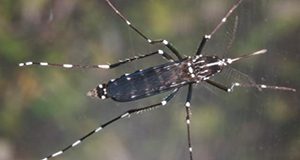
Being bitten by the container mosquitoes Aedes aegypti and Ae. albopictus means a higher risk of becoming infected with Zika, dengue, or chikungunya virus. Container mosquitoes develop in the water that collects in discarded tires, jars, cans, buckets, and boats. The best way to prevent irritating bites and dangerous mosquito-transmitted illnesses is to get rid of all trash that holds water. This 6-page fact sheet written by Amy Hallock, Eva A. Buckner, Ricky W. Telg, and Alena R. Poulin and published by the UF/IFAS Entomology and Nematology Department is packed with recommendations that will help you to successfully develop and host a cleanup event to reduce potential mosquito larval habitats in your community and keep yourself and your neighbors safe.
https://edis.ifas.ufl.edu/in1286